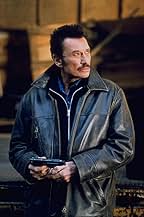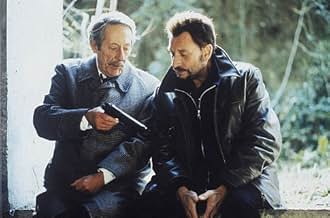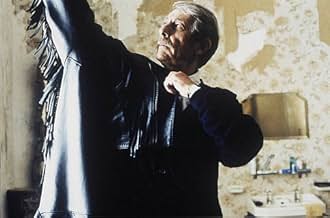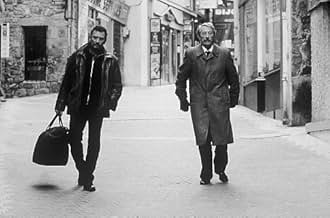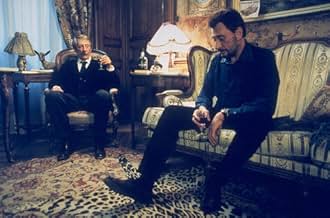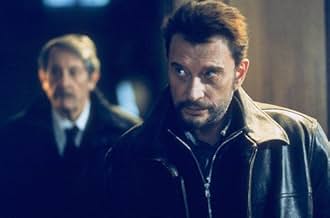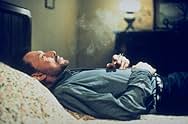L'homme du train
- 2002
- Tous publics
- 1h 30min
NOTE IMDb
7,1/10
7,7 k
MA NOTE
Un braqueur de banques débarque pour un casse dans une petite ville française et se lie d'amitié avec un professeur de poésie à la retraite.Un braqueur de banques débarque pour un casse dans une petite ville française et se lie d'amitié avec un professeur de poésie à la retraite.Un braqueur de banques débarque pour un casse dans une petite ville française et se lie d'amitié avec un professeur de poésie à la retraite.
- Réalisation
- Scénario
- Casting principal
- Récompenses
- 8 victoires et 10 nominations au total
Avis à la une
'The Man on the Train' is a beautiful movie about two man later in life. One of them is a bank robber, the other is a teacher. They meet by accident and become friends. Slowly they both start wishing they would have been the other man.
The teacher (Jean Rochefort) knows what the bank robber (Johnny Hallyday) does for his money. He even offers to help, but the day the bank will be robbed he has to go into surgery. We see how the teacher pretends to be a cool guy, even changes his looks to that. We also see how the bank robber pretends to be a teacher when the real teacher is out.
All this leads to an ending that closes things in one way, but leaves things open in another. We feel an ending like this coming, but it still works. It is beautiful and fits the rest of the movie perfectly.
If your favorite movies are like 'The Fast and the Furious' you will probably not like this. It is a real European movie, sometimes slow, most of the time very quiet, but if you can appreciate this kind of film making you will like 'The Man on the Train'.
The teacher (Jean Rochefort) knows what the bank robber (Johnny Hallyday) does for his money. He even offers to help, but the day the bank will be robbed he has to go into surgery. We see how the teacher pretends to be a cool guy, even changes his looks to that. We also see how the bank robber pretends to be a teacher when the real teacher is out.
All this leads to an ending that closes things in one way, but leaves things open in another. We feel an ending like this coming, but it still works. It is beautiful and fits the rest of the movie perfectly.
If your favorite movies are like 'The Fast and the Furious' you will probably not like this. It is a real European movie, sometimes slow, most of the time very quiet, but if you can appreciate this kind of film making you will like 'The Man on the Train'.
1st watched 8/9/2003 - 7 out of 10(Dir-Patrice Leconte): Wonderful drama about two men who want to switch places in life because each is bored of what their life has become. One is a bank robber, and the other is a retired poetry teacher. The bank robber is plain tired of the excitement and the other wants excitement in his life. The retired poetry teacher also has an upcoming triple-bypass heart surgery that lends to his aggressiveness about trying out the other lifestyle. Like many French dramas, this movie takes it's time and explores the characters and let's us get to know them. This is `so' lacking in most American films these days and therefore this is a breath of fresh air for those who are okay with reading subtitles. While watching this movie you get the feeling that you're watching two `real' people interacting despite their differences. Do they ever switch places? Well, sort of but like other French dramas `reality' is where the film stays for the most part. The ability for the characters to understand and accept each other is `just' wonderful and makes a wonderful statement about how we should `all' interact and I think this is what makes this film remarkable.
We know this film from childhood, but the child has grown. Here we are in a provincial French city when the cowboy rides in on the iron train to transform the life of a citizen, unexpectedly, profoundly.
Jean Rochefort, with his great face of character, about to go for major surgery, a three vessel bypass, a wifeless man of regrets, a retired teacher of literature to secondary students, is about to meet his fantasy: Johnny Hollyday (the Elvis of France?) who plays a bank robber about to perform his retirement job. Meeting by apparent chance, though clearly pre-ordained, the fantasies of the lonely, anxious teacher whose love of poetry might be his most tender trait in an otherwise ruthlessly real view of the world, are set in motion. Hollyday becomes his unexpected guest...the lone hotel is closed for the season...and an excitement comes to Rochefort's life. The man has guns. There is a picture of him looking terribly western in his leather jacket, the enigmatic stranger/cowboy in the mythos of his host. Ah, to be that man, to fire that gun, to live that life of dark adventure.
It goes on to its meaningful end, not told here except to say that the last scene may be an error, a prolongation that was unnecessary and added nothing to the power of the film, nor detracted from the marvelous performance of Rochefort, who can do no wrong with any role, or Hollyday, whose acting turn here is perfect in the Robert Mitchum noir sense, but tinged with an old-world tiredness that is quite moving. All this with fine subsidiary acting, a perfectly murky Simenonoish setting, and Schubert's melancholic sounds. Ah, bon. Tres, tres bon.
Jean Rochefort, with his great face of character, about to go for major surgery, a three vessel bypass, a wifeless man of regrets, a retired teacher of literature to secondary students, is about to meet his fantasy: Johnny Hollyday (the Elvis of France?) who plays a bank robber about to perform his retirement job. Meeting by apparent chance, though clearly pre-ordained, the fantasies of the lonely, anxious teacher whose love of poetry might be his most tender trait in an otherwise ruthlessly real view of the world, are set in motion. Hollyday becomes his unexpected guest...the lone hotel is closed for the season...and an excitement comes to Rochefort's life. The man has guns. There is a picture of him looking terribly western in his leather jacket, the enigmatic stranger/cowboy in the mythos of his host. Ah, to be that man, to fire that gun, to live that life of dark adventure.
It goes on to its meaningful end, not told here except to say that the last scene may be an error, a prolongation that was unnecessary and added nothing to the power of the film, nor detracted from the marvelous performance of Rochefort, who can do no wrong with any role, or Hollyday, whose acting turn here is perfect in the Robert Mitchum noir sense, but tinged with an old-world tiredness that is quite moving. All this with fine subsidiary acting, a perfectly murky Simenonoish setting, and Schubert's melancholic sounds. Ah, bon. Tres, tres bon.
This movie must be seen! Too many people think about French films as too slow, boring and too "intellectual". L'Homme du Train is the opposite: ironic, funny without being obvious or foreseen. Two protagonists and a director: a perfect alchemy between the three.
Leconte uses the camera "inside" the characters, Rochefort and Hallyday are superb in their roles. Moreover everyone can identify with one of the two: everyone dreamt at least once to be someone else! Leconte makes the dream true!
Leconte uses the camera "inside" the characters, Rochefort and Hallyday are superb in their roles. Moreover everyone can identify with one of the two: everyone dreamt at least once to be someone else! Leconte makes the dream true!
"Man on the Train (L'Homme du train)" is a small story of cumulative details done exceedingly well that could simply not be done by Hollywood.
The excellent leads, each charismatic in his own way, talky Jean Rochefort and taciturn Johnny Hallyday (who brings none of his pop star baggage to an American audience), are past middle age. There is a lot of Rohmer-like sitting around talking over a bottle of wine.
The emphasis is on very gradual, internal realizations by each character that are revealed by a subtle accretion of surprising little decisions, such as wearing slippers or getting a new haircut, culminating in an unpredictable, yet beautifully satisfying conclusion.
Photographed in a shades of gray palette that is almost in black-and-white, a small town and its interconnections and personalities are beautifully evoked.
The women in their lives are ancillary, which is just as well, as they are not completely believable.
The poetry teacher is too sophisticated to quote John Greenleaf Whittier, but I will, on the theme: "Of all the words of tongue or pen/the saddest are these/It might have been."
The excellent leads, each charismatic in his own way, talky Jean Rochefort and taciturn Johnny Hallyday (who brings none of his pop star baggage to an American audience), are past middle age. There is a lot of Rohmer-like sitting around talking over a bottle of wine.
The emphasis is on very gradual, internal realizations by each character that are revealed by a subtle accretion of surprising little decisions, such as wearing slippers or getting a new haircut, culminating in an unpredictable, yet beautifully satisfying conclusion.
Photographed in a shades of gray palette that is almost in black-and-white, a small town and its interconnections and personalities are beautifully evoked.
The women in their lives are ancillary, which is just as well, as they are not completely believable.
The poetry teacher is too sophisticated to quote John Greenleaf Whittier, but I will, on the theme: "Of all the words of tongue or pen/the saddest are these/It might have been."
Le saviez-vous
- AnecdotesJean Rochefort died in October 2017. Two months later, Johnny Hallyday died.
- ConnexionsReferenced in 69 minutes sans chichis: Johnny Hallyday (2015)
- Bandes originalesImpromptu in A-flat Major, Op. 142 No. 2 (D. 935)
Written by Franz Schubert
Meilleurs choix
Connectez-vous pour évaluer et suivre la liste de favoris afin de recevoir des recommandations personnalisées
- How long is Man on the Train?Alimenté par Alexa
Détails
- Date de sortie
- Pays d’origine
- Site officiel
- Langue
- Aussi connu sous le nom de
- Man on the Train
- Lieux de tournage
- Sociétés de production
- Voir plus de crédits d'entreprise sur IMDbPro
Box-office
- Montant brut aux États-Unis et au Canada
- 2 542 020 $US
- Week-end de sortie aux États-Unis et au Canada
- 41 138 $US
- 11 mai 2003
- Montant brut mondial
- 7 727 906 $US
- Durée
- 1h 30min(90 min)
- Couleur
- Mixage
- Rapport de forme
- 2.35 : 1
Contribuer à cette page
Suggérer une modification ou ajouter du contenu manquant


